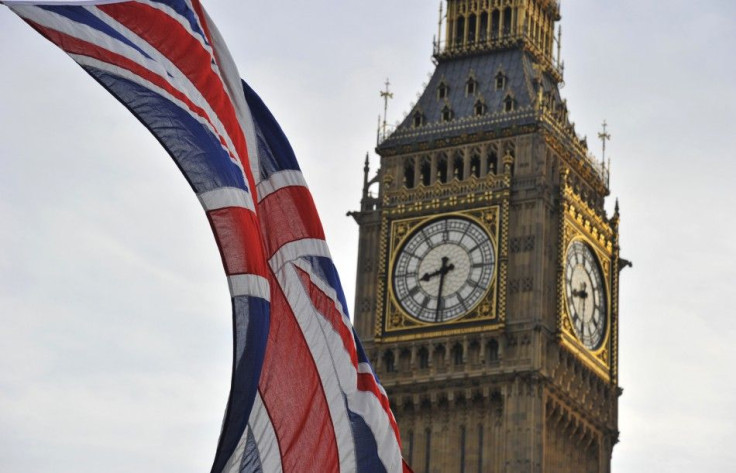UK Cuts Income Tax Amid Austerity Effort

(Reuters) - British finance minister George Osborne cut the top rate of income tax while imposing new levies on the wealthy, in a political high wire act designed to rejig the burden of austerity without wavering on plans to erase a huge budget deficit.
Britain should avoid a renewed recession and while the recovery was set to remain modest this year, growth should pick up thereafter, Osborne told parliament in his annual budget statement on Wednesday.
A sometimes uneasy coalition government of centre-right Conservatives and more left-wing Liberal Democrats has made erasing a huge budget deficit - which topped 11 percent of GDP before it took office - within the next five years its core objective, and the latest forecasts showed it remained on track.
With no money left to boost an economy that has not fully recovered from a slump caused by the 2007-2009 global crisis, Osborne focused on a flurry of tax measures, some of which represent a major political gamble.
In a move that will please his own Conservative party, he cut a 50 percent income tax band for the highest earners to 45 percent, from next year on. The Conservatives say that high a levy is a barrier to aspiration and entrepreneurship. The Labour opposition say it is a fair way to spread the pain.
In a nod to the Liberal Democrats, the junior coalition partner, Osborne raised the threshold at which income tax starts to be paid by more than previously announced to 9,205 pounds ($14,300), taking more poorly paid people out of the tax net.
Osborne also introduced a higher 7 percent stamp duty rate on sales of property worth more than 2 million pounds while corporation tax will fall faster and further than announced so far.
We'll be getting five times more money each and every year from the wealthiest in our society, he said, in a statement the opposition immediately challenged.
What planet are he and the prime minister living on ... how can the priority be a tax cut for the richest one percent, opposition Labour Party leader Ed Milliband said, while trade unions talked of a budget for the rich by the rich.
GAMBLE
Mindful of the risk that heavily indebted Britain could lose its prized top-notch credit rating, Osborne said there was no room to overall soften unprecedented spending cuts, aimed at reducing sky-high debts.
A shock jump in public sector borrowing to a record for February, announced ahead of the budget statement, provided a stark reminder that the chancellor of the exchequer has no scope to provide the fragile economy with a significant boost.
This budget reaffirms our unwavering commitment to deal with Britain's record debts, Osborne said in his budget speech.
Despite ongoing risks from the euro zone debt crisis, Britain's economy was set to avoid a renewed recession and growth is expected to pick to a heady 3.0 percent rate by 2015, Osborne said, something many economists view as optimistic.
Ratings agencies have warned Britain that it could be downgraded, with apparently only Osborne's unwavering determination to cut the deficit keeping them onside for now.
It was very much a political exercise and in that regard it will stick in the memory for a lot longer, but not for the macro impact, Alan Clarke, economist at Scotia Capital said.
Any hopes for stimulus still rest squarely with the central bank and minutes of its last policy meeting, issued earlier on Wednesday, suggested the chances of more money printing are receding.
The budget drew applause from business lobbies but political analysts cautioned the jury of public opinion was still out.
There is no doubt that in doing it he's taking a big political risk, John Curtice, politics professor at Strathclyde University said. There's enough room for argument about whether or not this is fair for the opposition to criticize it on that ground.
Within the coalition, the balance of power was seen largely unchanged. The Liberal Democrats can make some claims about it being a Robin Hood budget and the Conservatives can point to the fact that they've made some tax reductions and that they've helped business, said Tim Bale, politics professor at Sussex University and expert on the Conservative Party.
AUSTERITY
Britain was hit hard by the 2007-2009 financial crisis and had to spend tens of billions to bailout major banks.
The recovery from the steep slump has been weak, with the economy still running well below its pre-crisis peak and the unemployment rate at its highest in 16 years.
Many Britons have experienced the worst squeeze on their living standards in at least a generation as price rises outpaced meager wage growth and the government's tax increases and austerity measures are eating into households budgets.
But in recent weeks, the overall mood among businesses perked up after taking a severe knock from the euro zone crisis at the end of last year.
The government's Office for Budget Responsibility forecast that growth should pick up from the 0.8 percent predicted for 2012 to 2.0 percent next year and 2.7 percent in 2014, leaving its November predictions largely unchanged.
It predicted that net borrowing would fall from 126 billion pounds in 2011/2012 to 21 billion in 2016/2017.
Overall Britain's public sector debt as a share of gross domestic product (GDP) will peak at 76.3 percent in 2014/15 before falling, fulfilling the second part of the fiscal target.
We continue to think that the OBR's growth forecasts look optimistic and that the government will soon start finding it rather harder to bring down borrowing, said Vicky Redwood, Chief UK Economist at Capital Economics Ltd. said. For now, though, the UK's safe-haven status looks secure.
© Copyright Thomson Reuters 2024. All rights reserved.











